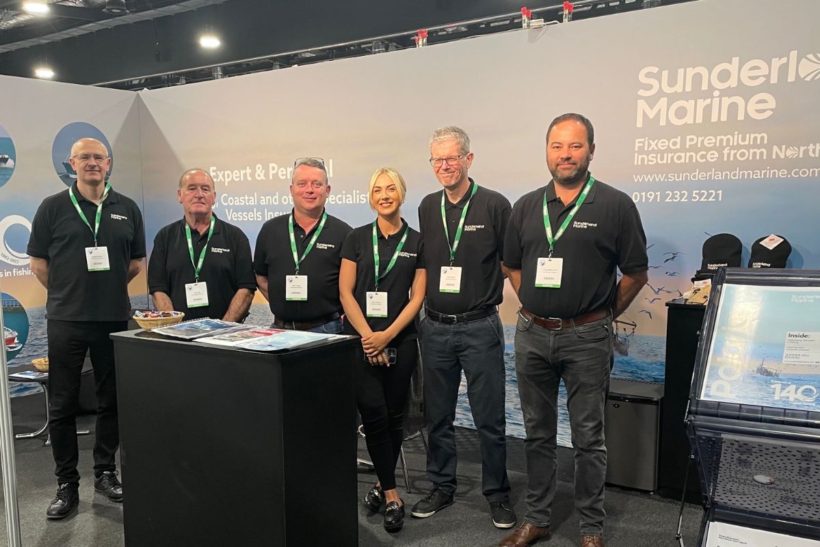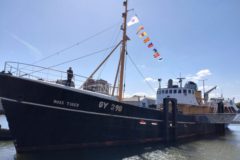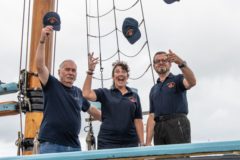Gaby Bartai talks to Craig McBurnie, director of Sunderland Marine, about the company’s 140 years of support for the fishing industry – and what the future holds
At Sunderland Marine, it’s all about people, says director Craig McBurnie. “In an everchanging world of internet insurance quotes, we are still a personal face-to-face service.
“We have individual relationships with owners, with skippers, going back many many years and in some cases many generations – so people are going to the same individual at Sunderland Marine who they’ve dealt with for many years, and who will understand what they’re talking about, who will speak the same language, who will know the rhythms of the industry, and be able to empathise with their situation.”
The company’s underwriters include at least one ex-fisherman and a number who have previously worked in industry management roles, alongside people from other backgrounds who have acquired their fisheries expertise on the job. A number – including Craig himself, who joined as an assistant underwriter in 1996 – have been with the company for over 25 years.
“It sounds like a cliché, but far and away our biggest asset is our people. We have such a breadth of knowledge and experience – people who have invested a lot of time in learning how the industry works, and how we can best respond. And I think that is the reason that Sunderland Marine has been so successful, and why we’re still here 140 years later.
“It’s nice to celebrate things from time to time in the industry, and we have obviously been promoting our 140-year anniversary this year, which we think is an important milestone, working with the fishing industry for so many years – and we absolutely see ourselves as part of it.
“We share fortunes, up and down, with the fishing industry, in the UK and further afield, and we feel part of that community.”
The company’s involvement with the industry goes right back to the beginning. “Very very early in Sunderland Marine’s history we were insuring tugs and fishing vessels in the port of Sunderland and the North East, and fairly rapidly that spread to the whole UK.
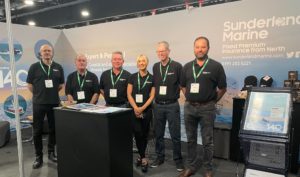
Sunderland Marine staff at the Scottish Skipper Expo in May. Left to right: Graham Darke, Alan Ure, John Lamb, Holly Rowley, David Burke and Craig McBurnie.
“Even though we have a global spread now – we have business in about 60 countries worldwide – the UK is still a cornerstone of our business. And fishing is roughly two-thirds of our overall income.”
Sunderland Marine is now part of North Group, which was formed in 2014 following a merger between Sunderland Marine and North P&I, one of the world’s leading marine insurers – and, like Sunderland Marine, a mutual, meaning that it is owned by its members.
Key to the personal service the company prides itself on is ensuring that each claim is handled in a way that works for the individual policyholder – so, for example, an owner will be allowed to use their regular yard for repairs where this is possible. “So it’s not just about cost-effectiveness, it’s also about who’s going to do the best job to get the boat back to sea as quickly as possible. There is no fixed formula of how we want to do things. We will always work with and listen to the fisherman.
“We share fortunes, up and down, with the fishing industry, and we feel part of that community”
“We always say we like to find a way to pay claims. We will listen to the owner; we’ll be sympathetic. If there’s a reasonable claim, we’ll help the best we can – and as soon as a claim has been accepted, we’ll find a way to settle as soon as practically possible.
“There’s a huge amount of trust built up once you show you’re able to respond to an emergency. We’ve demonstrated time and again that we understand the perils of the sea – we understand when we need to step in, when we can offer assistance, when we need to hold an owner’s hand, and when we need to listen. And that stands us in good stead, and again goes back to the people we have – they know what they’re talking about.”
So even in 2022, you’ll still find Sunderland Marine staff, and their local surveyors, down on the quayside, getting to know the local industry. “We’re always on the road. We like to see as many owners and as many vessels and go to as many ports as possible over the course of the year. I think it’s really important that you stay connected with what’s happening with the industry. It evolves so quickly, and if you lose track of that, you lose what you are.”
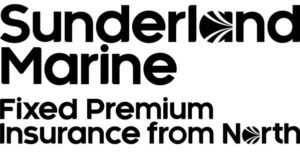 There are two sides to the coin for an insurer – making sure that boats are covered in the event of an accident, but also taking steps to reduce claims by focusing on loss prevention. Sunderland has extended this role, putting a lot of work into getting the safety message across. “This is something we’re extremely passionate about. For us, safety at sea and the training of crew is absolutely paramount for a successful industry. We’ve worked alongside government bodies like the MCA and Seafish, but also with training colleges, throughout the UK and overseas. This is our way of giving something back.
There are two sides to the coin for an insurer – making sure that boats are covered in the event of an accident, but also taking steps to reduce claims by focusing on loss prevention. Sunderland has extended this role, putting a lot of work into getting the safety message across. “This is something we’re extremely passionate about. For us, safety at sea and the training of crew is absolutely paramount for a successful industry. We’ve worked alongside government bodies like the MCA and Seafish, but also with training colleges, throughout the UK and overseas. This is our way of giving something back.
“You can have the best equipment in the world – and there have been many technological advances in the last 20 or 30 years that have made vessels safer – but without the training on how to use that equipment, it’s not worth very much, so it has to go hand in hand. This is why we’ve invested so much time and resources in helping training colleges, for example, bring new entrants into the industry and train existing crew.
“We’ve also invested our own resources in producing loss prevention guides – everything from a new starters’ guide to emergency situations: man overboard, fire onboard, all the things that sadly do happen at sea – and these have proved extremely popular.” Key to their success is that they’re designed to be accessible, with succinct bullet points and cartoon-style illustrations helping to get the message across. Requests have come in from overseas for permission to produce translations, into Dutch, French, Spanish and even Cantonese. “So it’s obviously been well received, the message that we’re sending out.
“Obviously lower risk is a positive thing for us as insurers, but it’s also better for owners and crew to be on a safe vessel.”
Sunderland Marine’s support for new entrants to the industry includes sponsorship of the Fishing News Awards Trainee Fisherman of the Year, won this year by 17-year-old Isla Gale from the Isle of Man. “It is fantastic to hear about young people who’ve really thrown themselves into the industry – and they’re hopefully going to be around a long, long time, as examples to others.
“Whether it be Shetland or Whitby or somewhere on the south coast, getting young people into fishing is critical. There are often statistics thrown around about the average age of a crewman, and how that keeps rising – so any little thing we can do to get young people into the industry is fantastic.”
So how does the future look from the perspective of a marine insurer? “If you had a crystal ball for the fishing industry, you’d be in a very lucky place.
“We’re hoping that we’re learning to live in a post-pandemic world. And the industry itself is going through technological developments all the time, which will be very exciting. The new vessels that are coming out of yards now, the key word is efficiency.
“Fuel efficiency is going to be the thing that’s here to stay, and we’ll see where that goes next, with technological developments, as we move away from fossil fuels, ultimately. It’s hard to have a crystal ball to see how it’s going to end, but certainly the future of fishing is going to rest on how it manages technical and environmental demands.
“I’ve been doing this job for more than 25 years now, and I remember the first week I started reading a newspaper article saying that the fishing industry in the UK was dying, that it couldn’t survive – there was a whole list of problems. There’s going to be always a new issue to tackle, but the fishing industry is absolutely resilient, and it has always found a way back.
“If you think of the last few years, there’s been Covid-19, there’s been Brexit, and all the red tape and costs that go with that, and now we’ve got the fuel crisis with the war in Ukraine… and the industry will find a way to evolve – and flourish. And we see ourselves evolving hand and hand with that.”
This story was taken from the latest issue of Fishing News. For more up-to-date and in-depth reports on the UK and Irish commercial fishing sector, subscribe to Fishing News here or buy the latest single issue for just £3.30 here.



